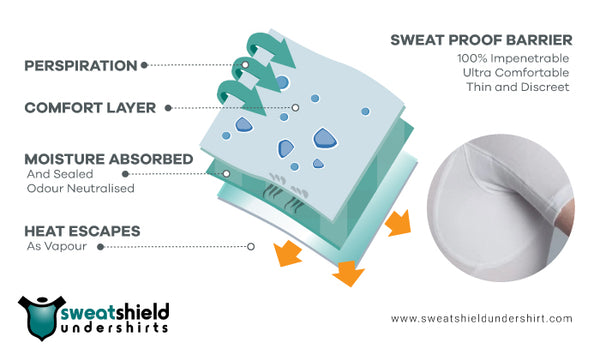Night sweats is a term used to describe a condition in which one sweats excessively during the night.
A person suffering from night sweats may wake up to find their bedding and nightclothes drenched in sweat, possibly accompanied by odor.
Understandably, this can cause great discomfort and embarrassment.
Night sweats are common, affecting approximately 10 million Americans (about 3 percent of the population).
Excessive sweating at night may be caused by simple factors such as:
- What you ate before going to bed
- Covering yourself with heavy or too many blankets
- The temperature in your room
Although these factors aren’t particularly a cause for concern, night sweats can also be an indication of a serious medical condition.
For this reason, you should consult a doctor to identify the underlying cause if you experience several episodes of night sweats.
That said, sweating is a normal and healthy process; it's the body's natural way of cooling down to prevent overheating.
The hypothalamus is the part of your brain that determines when your body needs to produce sweat.
To keep you cool, the hypothalamus stimulates over 2 million sweat glands.
As sweat evaporates, it releases the heat around the skin. In turn, this results in a cooling sensation on the skin.
Night sweats are one way in which hyperhidrosis, the medical term for excessive sweating, manifests itself.
Four areas on our bodies are more prone to excessive sweating due to hyperhidrosis than others:
- Feet (Plantar hyperhidrosis)
- Palms (Palmar hyperhidrosis)
- Armpits (Axillary hyperhidrosis)
- Head and face (Craniofacial hyperhidrosis)
This article will help you to better understand the common causes of night sweats, as well as what you can do about the condition.
What Are the Causes of Night Sweats?
When there's no identifiable cause for your night sweats, this is referred to as idiopathic hyperhidrosis. This is believed to be a result of hereditary factors.
Spicy food, a hot day, or an intense workout aren't the only culprits that can trigger the hypothalamus to start the process of cooling you down.
Medical conditions can cause excess sweat production, especially during sleep. These conditions are highlighted below.
Hormone Imbalance
Also called endocrine imbalance, this can be attributed to:
- The onset of menopause
- Puberty
- Thyroid disease
- Diabetes
- Pregnancy
Infection
The infection most commonly associated with night sweats is tuberculosis (TB). Others include influenza and human immunodeficiency virus (HIV), as well as febrile illness.
Sleep Apnea
If you experience obstructive sleep apnea, the walls of your throat narrow, restricting air and affecting your breathing.
If your sleep apnea goes untreated, you're three times more likely to suffer from night sweats than the general population.
Cancer
Lymphoma and leukemia are associated with night sweats. Heavy sweating may occur in the early stages and could be accompanied by other symptoms.
Gastroesophageal Reflux Disease
Gastroesophageal reflux (GER) occurs when acidic food contents travel back up the esophagus. This causes acid reflux (commonly referred to as heartburn).
Gastroesophageal reflux disease (GERD) is a more serious and chronic form of GER. Night sweats are among other symptoms of this condition.
Medication
Certain types of medication are known to trigger night sweats, including:
- Antidepressants
- Hormones
- Diabetes medications
- Pain relievers
- Steroids
You can find a list of commonly prescribed drugs associated with night sweats as a side effect here.
Consult your doctor or pharmacist with any questions regarding possible side effects of any medication you're taking.
How Can You Stop Night Sweats?
The best treatment options for night sweats depends upon the root cause.
For instance, if your sweats are a result of endocrine imbalance, you should correct hormone irregularities.
Or, in the case of menopause, hormone treatment can help reduce the intensity of night sweats if lifestyle changes fail to show improvement.
Night sweats with no underlying cause can be treated and managed in various ways, such as:
- Avoiding spicy foods, caffeine, and alcoholic drinks
- Allowing 3 to 4 hours after eating before going to bed
- Sleeping in a cool/well-ventilated room
- Using nightclothes and sheets made of light, breathable, organic fabric (e.g., cotton)
- Using an antiperspirant on body areas most susceptible to heavy sweating
- Maintaining an active lifestyle
- Maintaining a healthy body weight
- Drinking plenty of water during the day
- Taking anticholinergic medication, only if recommended by a doctor
There's still more you can do to manage your sweat.
Try Sweat Proof Clothing
Regardless of the cause, one thing is for sure: night sweats are uncomfortable. And, even while undergoing treatment, it's likely that you'll continue to have these episodes.
Use sweat proof clothing as a way to make night sweats more manageable.
While regular clothing is bound to get stained by unsightly yellow spots, sweat proof undershirts have a sweat proof barrier designed to:
- Absorb moisture
- Keep you cool
- Prevent odor
No One Does Sweatproof Better Than Sweatshield
Developed over a 10 year period, Sweatshield undershirts offer unparalleled sweat resistance and comfort in a tailored fit.
And, not only are they ideal for keeping you cool at night, but they also look stylish enough to go with your everyday outfits.
It's no wonder that Sweatshield undershirts have made a difference for many, garnering stellar reviews across the board.
Whether you're in need of women's or men's undershirts and boxers, Sweatshield has you covered - literally.
Photo: Ivan Oboleninov










